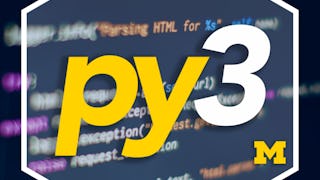This advanced-level course is designed to empower Python developers with the practical expertise required to build scalable, secure, and highly customizable web applications using the Pyramid framework. Learners will progressively move from foundational view configuration to sophisticated application structuring, integrating Pyramid’s flexible routing models, session management, authorization policies, and test-driven development techniques.



Expérience recommandée
Compétences que vous acquerrez
- Catégorie : Restful API
- Catégorie : File Management
- Catégorie : Functional Testing
- Catégorie : Software Testing
- Catégorie : Integration Testing
- Catégorie : Authentications
- Catégorie : Configuration Management
- Catégorie : Test Case
- Catégorie : Server Side
- Catégorie : Unit Testing
- Catégorie : Application Security
- Catégorie : Web Applications
- Catégorie : Authorization (Computing)
- Catégorie : Identity and Access Management
- Catégorie : Secure Coding
- Catégorie : Web Frameworks
- Catégorie : Verification And Validation
- Catégorie : Application Frameworks
- Catégorie : Web Development
- Catégorie : Role-Based Access Control (RBAC)
Détails à connaître

Ajouter à votre profil LinkedIn
juillet 2025
19 devoirs
Découvrez comment les employés des entreprises prestigieuses maîtrisent des compétences recherchées

Il y a 6 modules dans ce cours
This module introduces learners to the foundational concepts of the Pyramid micro-framework in Python. It explores the flexible, scalable architecture of Pyramid, emphasizing view configurations, rendering strategies, and the essential components required to build maintainable web applications. Learners will gain hands-on experience with decorators, route mapping, and view setup, building the groundwork for advanced application structuring in subsequent modules.
Inclus
8 vidéos3 devoirs
This module introduces learners to the critical aspects of managing static files and handling HTTP requests and responses within Pyramid applications. Students will explore how to register and serve static assets efficiently, override asset behaviors when necessary, and leverage Pyramid’s request and response objects to build dynamic, interactive web interfaces. By mastering these foundational mechanisms, learners will enhance the performance, flexibility, and user experience of Pyramid-based applications.
Inclus
7 vidéos3 devoirs
This module explores the core mechanisms behind maintaining user state, securing form interactions, and validating application behavior through testing in Pyramid. Learners will understand how to manage user sessions, implement flash messaging for user feedback, guard against CSRF attacks, and write both unit and functional tests using Pyramid’s testing utilities. The module also covers the foundational and advanced configuration patterns required to scaffold scalable and testable applications.
Inclus
8 vidéos4 devoirs
This module explores Pyramid's traversal-based routing system through the concept of resource trees, enabling developers to map URLs to Python object hierarchies. Learners will examine how to generate resource URLs, understand lineage relationships, and define access control mechanisms using ACLs and ACEs. The module also dives into the structure and configuration of authorization policies, providing a clear understanding of how permissions and security integrate within resource-based routing.
Inclus
7 vidéos3 devoirs
This module introduces Pyramid’s authentication mechanisms and explores how user identity and permissions are managed within web applications. It explains how to configure authentication policies, manage login sessions using remember() and forget(), and work with authenticated principals. The module also delves into traversal and hybrid routing patterns, showing how to combine URL dispatch with object-based resource traversal for greater control and flexibility in route handling.
Inclus
6 vidéos3 devoirs
This module explores advanced response handling and dynamic view control in Pyramid applications. Learners will delve into invoking subrequests for internal logic reuse, customizing not found and forbidden views for robust error handling, and enhancing request objects using custom request factories. Additionally, the module introduces response callbacks and Pyramid’s URL generation mechanics, enabling learners to fine-tune how responses are constructed and how dynamic URLs are produced. The techniques covered here equip developers to deliver flexible, maintainable, and consistent responses across complex web applications.
Inclus
8 vidéos3 devoirs
Obtenez un certificat professionnel
Ajoutez ce titre à votre profil LinkedIn, à votre curriculum vitae ou à votre CV. Partagez-le sur les médias sociaux et dans votre évaluation des performances.
En savoir plus sur Software Development
 Statut : Essai gratuit
Statut : Essai gratuitUniversity of Michigan
 Statut : Essai gratuit
Statut : Essai gratuitMicrosoft
Pour quelles raisons les étudiants sur Coursera nous choisissent-ils pour leur carrière ?





Ouvrez de nouvelles portes avec Coursera Plus
Accès illimité à 10,000+ cours de niveau international, projets pratiques et programmes de certification prêts à l'emploi - tous inclus dans votre abonnement.
Faites progresser votre carrière avec un diplôme en ligne
Obtenez un diplôme auprès d’universités de renommée mondiale - 100 % en ligne
Rejoignez plus de 3 400 entreprises mondiales qui ont choisi Coursera pour les affaires
Améliorez les compétences de vos employés pour exceller dans l’économie numérique
Foire Aux Questions
To access the course materials, assignments and to earn a Certificate, you will need to purchase the Certificate experience when you enroll in a course. You can try a Free Trial instead, or apply for Financial Aid. The course may offer 'Full Course, No Certificate' instead. This option lets you see all course materials, submit required assessments, and get a final grade. This also means that you will not be able to purchase a Certificate experience.
When you purchase a Certificate you get access to all course materials, including graded assignments. Upon completing the course, your electronic Certificate will be added to your Accomplishments page - from there, you can print your Certificate or add it to your LinkedIn profile.
You will be eligible for a full refund until two weeks after your payment date, or (for courses that have just launched) until two weeks after the first session of the course begins, whichever is later. You cannot receive a refund once you’ve earned a Course Certificate, even if you complete the course within the two-week refund period. See our full refund policy.
Plus de questions
Aide financière disponible,





